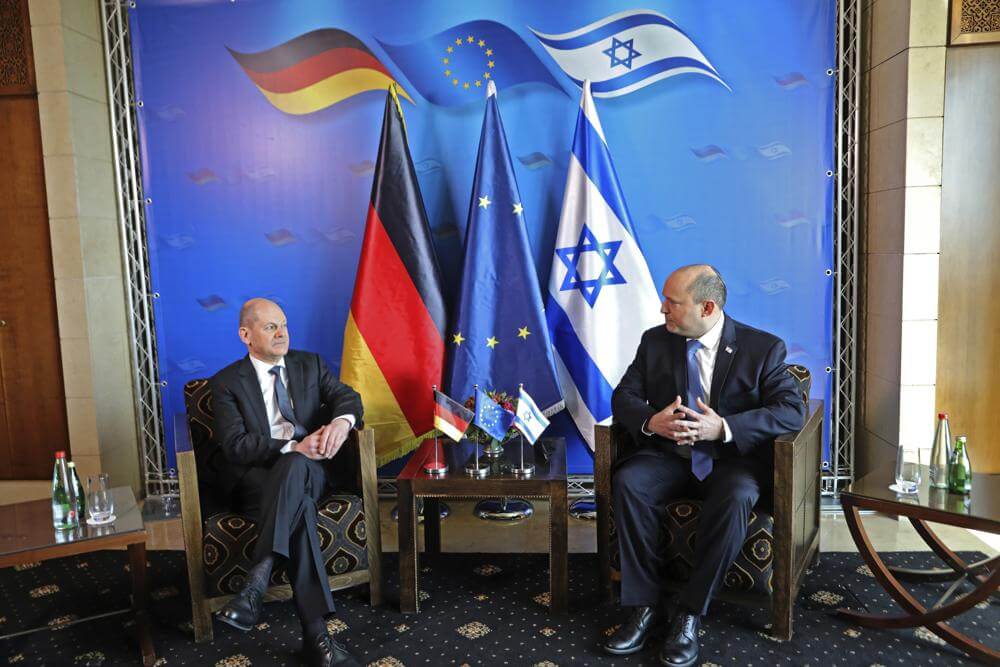Israeli Prime Minister (PM) Naftali Bennett on Wednesday told German Chancellor Olaf Scholz that a nuclear deal with Iran is “unacceptable” and that the deal will not prevent Iran from accelerating its nuclear programme.
Saying that Israel is “closely monitoring” the ongoing talks in Vienna between Iran and world powers to restore the 2015 nuclear deal, Bennett stressed that “the possibility that an agreement will be signed that allows Iran to install centrifuges on a broad scale within a few years […] is unacceptable to us.”
Bennett also told Scholz that Iran will never acquire a nuclear weapon on Israel’s watch. “Israel will know how to defend itself and ensure both its security and its future,” he said, adding that Israel expects the world not to support a “massive installation of centrifuges in another two-and-a-half years” if the deal fails to contain Iran’s nuclear programme.
Scholz, who is on his first official visit to Israel since taking office, said that a deal with Iran “cannot be postponed any longer” and his visit was aimed at convincing Israeli leaders that entering an agreement with Iran is the safest option. “What we would like to see is that an agreement is reached in Vienna [and] now is the time to make a decision,” Scholz said.
Iran and the P5+1 (the United States, the United Kingdom, France, Russia, China, and Germany) have been negotiating with Iran since April last year to restore the 2015 nuclear deal, formally known as the Joint Comprehensive Plan of Action (JCPOA). The US under former President Donald Trump had unilaterally exited the JCPOA in 2018.
It was an honor to host you in Israel, Chancellor @OlafScholz, and reaffirm the bond between Israel and Germany.
— Naftali Bennett בנט (@naftalibennett) March 2, 2022
The new strategic alliance that we are forming won’t just benefit both of our counties — it will be benefit both of our regions.
🇮🇱🇩🇪 pic.twitter.com/0xSwbwsrei
Israel remains opposed to any nuclear deal with Iran, as it views Tehran’s nuclear programme as an “existential threat,” especially since Iranian leaders have called for the annihilation of Israel. Bennett has accused Iran of advancing its nuclear programme amid the ongoing negotiations in Vienna to restore the deal.
In December, the International Atomic Energy Agency (IAEA) accused Iran of enriching uranium with highly advanced centrifuges at its Fordow nuclear power plant. The nuclear watchdog said that Tehran has started the process of enriching uranium to 20% purity using a cluster of 166 advanced IR-6 machines at Fordow.
The IAEA also reported in August that Iran has been enriching uranium to 60% fissile purity, closer to the weapons-grade level of 90%. The 2015 deal states that Iran could only enrich uranium up to 3.67% for the next 15 years.
However, Germany has been stepping up diplomatic efforts to get Israel to agree to a deal with Iran. Last month, German Foreign Minister Annalena Baerbock visited Israel and told Israeli officials that Germany was “convinced” that restoring the JCPOA will make the Middle East a safer place.
Apart from talks on the nuclear deal, Bennett announced a new “strategic cooperation” partnership between Germany and Israel. Calling it a “significant upgrade” in bilateral ties, Bennett said that cooperation “will be in the format of a bi-annual dialogue on security and diplomatic matters.”
Bennett and Scholz also discussed the ongoing situation in Ukraine and vowed to do their “utmost to stop the bloodshed, to bring what is going on from the battlefield to the negotiating table as quickly as possible.”

